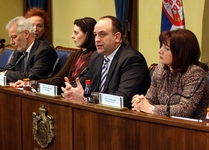- Serbia
Get to know Serbia
- Citizens
Culture and science
Health services
Pension and disability insurance
- Business
Employment
Economy
- Media
- Government
- Contact
Keep in touch
Contact form
Back
Keepin touch
Whether you have a question, comment, suggestion or any problem in the purview of the government, send us your message and we will try to respond as soon as possible. If your problem is not in our purview, we will forward your message to the relevant institution.
Q:
A:
Serbian government and NBS manage RLF
Belgrade,
2 February 2006
Serbian Minister of International Economic Relations Milan Parivodic said today that the European Agency for Reconstruction (EAR) transferred control over the Revolving Loan Fund (RLF) to the Serbian government. This fund will now be managed by the National Bank of Serbia (NBS).
Speaking at a press conference following the signing of the contract, Parivodic recalled that in 2001 the EAR signed a contract with the Serbian government and the NBS on starting a credit line for financing and development of SMEs in Serbia worth €5 million.
According to Parivodic, the 2001 contract envisaged that the NBS should establish the RLF, as well as the Department for managing the fund, which would be responsible for managing, administration and authorised spending control.
After rapid and successful realisation of the plan, the EAR decided to continue supporting the project in the same way. As a result, two more agreements on financing SMEs worth €10 million were signed, the minister said.
He pointed out that 247 loans from this credit line totaling €22.8 million have been realised so far, creating 2,284 new jobs.
The initial sum of €15 million has been increased to more than €25 million at present. Control over these funds has now been fully transferred to the NBS, said Parivodic and added that the NBS has granted the loans to SMEs through several commercial banks (Erste Bank, Komercijalna banka, Bank of Cacak, Cepter banka and HVB Bank).
The minister said that the average loan granted to SMEs so far stands at €93,000, with 6.9% annual interest rate.
According to Parivodic, past experience shows that 95 percent of these funds have been used for procuring equipment and the NBS is particularly careful when it comes to controlling authorised spending.
Parivodic explained that the NBS monitors and performs regular checks on the commercial banks through which the loans can be obtained and the companies which have been granted these loans.
Deputy Ambassador of the European Commission to Serbia-Montenegro Esmeralda Ernandez Aragones expressed satisfaction with the positive effect of the RLF in Serbia.
She remarked that the increase of the initial value of the fund from €15 million to €25 million is sufficient confirmation of authorised spending of the funds.
Head of the Operational Centre of the European Agency for Reconstruction (EAR) in Belgrade Daniel Giuglaris said that the EAR decided to transfer control over this fund to the Serbian government because this fund has proved greatly successful in Serbia.
According to Giuglaris, over the last five years the EAR has granted a total of €75 million for development of enterprises, training of employees and managers, and other employment programmes.
According to Parivodic, the 2001 contract envisaged that the NBS should establish the RLF, as well as the Department for managing the fund, which would be responsible for managing, administration and authorised spending control.
After rapid and successful realisation of the plan, the EAR decided to continue supporting the project in the same way. As a result, two more agreements on financing SMEs worth €10 million were signed, the minister said.
He pointed out that 247 loans from this credit line totaling €22.8 million have been realised so far, creating 2,284 new jobs.
The initial sum of €15 million has been increased to more than €25 million at present. Control over these funds has now been fully transferred to the NBS, said Parivodic and added that the NBS has granted the loans to SMEs through several commercial banks (Erste Bank, Komercijalna banka, Bank of Cacak, Cepter banka and HVB Bank).
The minister said that the average loan granted to SMEs so far stands at €93,000, with 6.9% annual interest rate.
According to Parivodic, past experience shows that 95 percent of these funds have been used for procuring equipment and the NBS is particularly careful when it comes to controlling authorised spending.
Parivodic explained that the NBS monitors and performs regular checks on the commercial banks through which the loans can be obtained and the companies which have been granted these loans.
Deputy Ambassador of the European Commission to Serbia-Montenegro Esmeralda Ernandez Aragones expressed satisfaction with the positive effect of the RLF in Serbia.
She remarked that the increase of the initial value of the fund from €15 million to €25 million is sufficient confirmation of authorised spending of the funds.
Head of the Operational Centre of the European Agency for Reconstruction (EAR) in Belgrade Daniel Giuglaris said that the EAR decided to transfer control over this fund to the Serbian government because this fund has proved greatly successful in Serbia.
According to Giuglaris, over the last five years the EAR has granted a total of €75 million for development of enterprises, training of employees and managers, and other employment programmes.
-
 Belgrade, 19 January 2026
Belgrade, 19 January 2026Deal reached on key provisions of NIS sale and purchase agreement
-
 Belgrade, 16 January 2026
Belgrade, 16 January 2026More than one-third of Growth Plan funds directed to energy sector
-
 Belgrade, 15 January 2026
Belgrade, 15 January 2026Goal to finalise NIS negotiations by end of week
-
 Belgrade, 23 December 2025
Belgrade, 23 December 2025Enhancing implementation of IPARD III programme
-
 Belgrade, 12 December 2025
Belgrade, 12 December 2025Construction of gas interconnector with North Macedonia by end-2027
-
 Belgrade, 8 December 2025
Belgrade, 8 December 2025Enormous public interest in registering illegal facilities
-
 Belgrade, 8 December 2025
Belgrade, 8 December 2025State doing everything to preserve stability of energy supplies
-
 Belgrade, 5 December 2025
Belgrade, 5 December 2025State doing everything to avoid shortage of oil derivatives
-
 Belgrade, 2 December 2025
Belgrade, 2 December 2025Serbia has not received positive decision from US over NIS
-
 Belgrade, 2 December 2025
Belgrade, 2 December 2025Spanish companies invited to invest in Serbian agriculture

